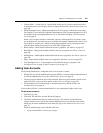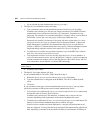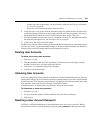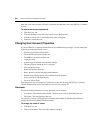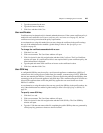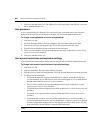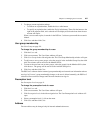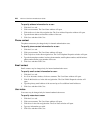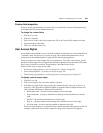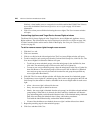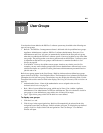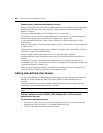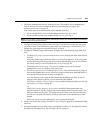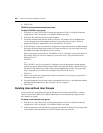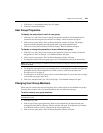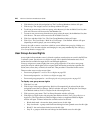
Chapter 17: Managing User Accounts 239
Custom field properties
You may specify any information you wish in the six custom fields. Custom field properties may
be changed only for internal authentication users.
To change the custom fields:
1. Click the Users tab.
2. Click on a username.
3. Click Custom Fields in the side navigation bar. The User Custom Fields window will open.
4. Type information in the fields.
5. Click Save and then click Close.
User Access Rights
Access rights indicate whether a user is allowed to perform certain actions on a unit in the DSView
3 software system. See About Access Rights on page 144 for detailed information and a list of
actions that can be enabled/disabled for target devices and managed appliances.
You may assign access control rights from a user perspective. You select a user account, specify
the units for which rights will be assigned, then indicate the permission to perform the action (none,
allow, deny or inherit) for each unit. That procedure is described in this section.
There are other ways to assign access rights:
• From a user group perspective - see User Group Access Rights on page 246
• From a unit perspective - see Unit Access Rights on page 146
• From a unit group perspective - see Changing the unit group properties on page 215
To display a user’s access rights:
1. Click the Users tab.
2. Click on a username. The User Name window will open.
3. Click Effective Rights in the side navigation bar and then click All Units, Target Devices or
Appliances. The Target Device Effective Rights or Appliance Effective Rights window will
open. Columns indicate the available actions for the unit.
• Black check mark - The user has been granted access for this right.
• Gray check mark - A group to which the user belongs has been granted access for this
right.
• Black X - The user has been denied access for this right.
•Gray X - A group to which the user belongs has been denied access for this right.
• No check mark - No access has been granted or denied for this right.
The access rights display for a target device may contain information that appears invalid. For
example, virtual media access can be enabled to a target device that does not support it.



